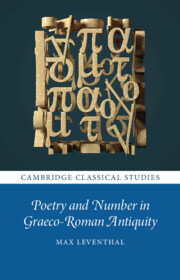Poetry and Number in Graeco-Roman Antiquity
Poetry and mathematics might seem to be worlds apart. Nevertheless, a number of Greek and Roman poets incorporated counting and calculation within their verses. Setting the work of authors such as Callimachus, Catullus and Archimedes in dialogue with the less well-known isopsephic epigrams of Leonides of Alexandria and the anonymous arithmetical poems preserved in the Palatine Anthology, this book reveals the various roles that number played in ancient poetry. Focusing especially on counting and arithmetic, Max Leventhal demonstrates how the discussion, rejection or enacting of these two operations was bound up with wider conceptions of the nature of poetry. Practices of composing, reading, interpreting and critiquing poetry emerge in these texts as having a numerical component. The result is an illuminating new way of approaching Greek and Latin poetry – and one that reaches across modern disciplinary divisions.
Max Leventhal is Bye-Fellow and College Lecturer in Classics at Downing College, Cambridge. He was previously the Thole Research Fellow at Trinity Hall, Cambridge and a British Academy Postdoctoral Fellow in the Faculty of Classics.

